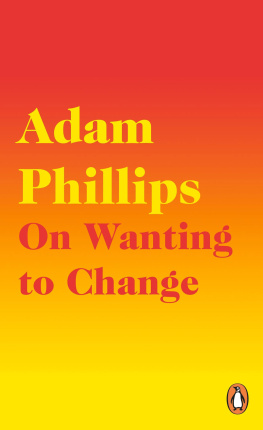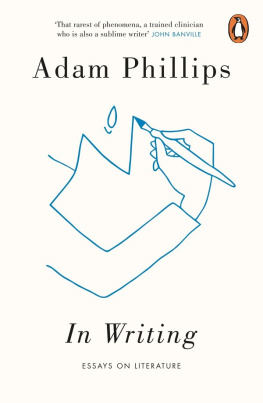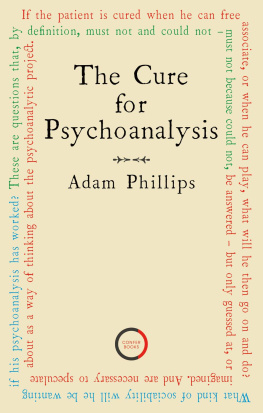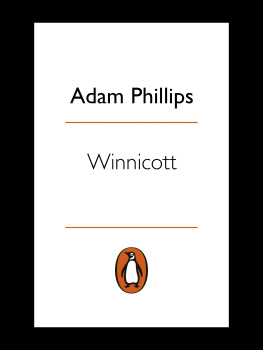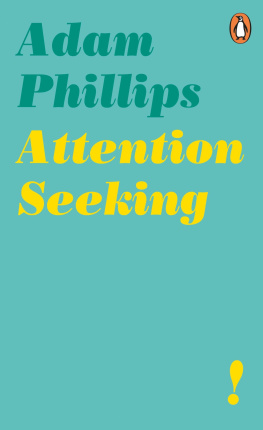Adam Phillips - On Wanting to Change
Here you can read online Adam Phillips - On Wanting to Change full text of the book (entire story) in english for free. Download pdf and epub, get meaning, cover and reviews about this ebook. year: 2021, publisher: Penguin Books Ltd, genre: Religion. Description of the work, (preface) as well as reviews are available. Best literature library LitArk.com created for fans of good reading and offers a wide selection of genres:
Romance novel
Science fiction
Adventure
Detective
Science
History
Home and family
Prose
Art
Politics
Computer
Non-fiction
Religion
Business
Children
Humor
Choose a favorite category and find really read worthwhile books. Enjoy immersion in the world of imagination, feel the emotions of the characters or learn something new for yourself, make an fascinating discovery.
- Book:On Wanting to Change
- Author:
- Publisher:Penguin Books Ltd
- Genre:
- Year:2021
- Rating:5 / 5
- Favourites:Add to favourites
- Your mark:
- 100
- 1
- 2
- 3
- 4
- 5
On Wanting to Change: summary, description and annotation
We offer to read an annotation, description, summary or preface (depends on what the author of the book "On Wanting to Change" wrote himself). If you haven't found the necessary information about the book — write in the comments, we will try to find it.
On Wanting to Change — read online for free the complete book (whole text) full work
Below is the text of the book, divided by pages. System saving the place of the last page read, allows you to conveniently read the book "On Wanting to Change" online for free, without having to search again every time where you left off. Put a bookmark, and you can go to the page where you finished reading at any time.
Font size:
Interval:
Bookmark:
Adam Phillips, formerly Principal Child Psychotherapist at Charing Cross Hospital, London, is a practising psychoanalyst and a visiting professor in the English department at the University of York. He is the author of numerous works of psychoanalysis and literary criticism, including most recently Attention Seeking, In Writing, Unforbidden Pleasures and Missing Out. He is General Editor of the Penguin Modern Classics Freud translations, and a Fellow of the Royal Society of Literature.
Winnicott
On Kissing, Tickling and Being Bored
On Flirtation
Terror and Experts
Monogamy
The Beast in the Nursery
Darwins Worms
Promises, Promises
Houdinis Box
Equals
Going Sane
Intimacies (with Leo Bersani)
Side Effects
On Kindness (with Barbara Taylor)
The Concise Dictionary of Dress (with Judith Clark)
On Balance
Missing Out
One Way and Another
Unforbidden Pleasures
Becoming Freud
The Vulgar (with Judith Clark)
In Writing
Attention Seeking
The Cure for Psychoanalysis
EDITOR OF
Charles Lamb: Selected Prose
The Electrified Tightrope: Selected Psychoanalytic
Papers of Michael Eigen
Richard Howard: Selected Poems (with Hugh Haughton)
John Clare in Context (with Hugh Haughton)
The Book of Interruptions (with David Hillman)
General Editor of the Penguin Modern Classics Freud translations

PENGUIN BOOKS
UK | USA | Canada | Ireland | Australia
New Zealand | India | South Africa
Penguin Books is part of the Penguin Random House group of companies whose addresses can be found at global.penguinrandomhouse.com.

First published by Penguin Books in 2021
Copyright Adam Phillips, 2021
The moral right of the author has been asserted
Penguin Random House would like to express thanks for use of excerpts from The World Turned Upside Down by Christopher Hill, copyright Christopher Hill, 1972, 1975, published by Temple Smith, 1972, Pelican Books, 1975, Peregrine Books, 1984, Penguin Books. 1991, 1991, 2019, reproduced by permission of Penguin Books, Ltd; Overland to the Islands by Denise Levertov from New Selected Poems (Bloodaxe Books, 2003); and Lullaby by Mary Ruefle from Indeed I was Pleased with the World, copyright Mary Ruefle, 2007, reprinted with the permission of The Permissions Company, LLC, on behalf of Carnegie Mellon University Press
Every effort has been made to trace copyright holders and to obtain their permission for the use of copyright material. The publisher apologizes for any errors or omissions and would be grateful to be notified of any corrections that should be incorporated in future editions of this book
ISBN: 978-0-241-97922-8
This ebook is copyright material and must not be copied, reproduced, transferred, distributed, leased, licensed or publicly performed or used in any way except as specifically permitted in writing by the publishers, as allowed under the terms and conditions under which it was purchased or as strictly permitted by applicable copyright law. Any unauthorized distribution or use of this text may be a direct infringement of the authors and publishers rights and those responsible may be liable in law accordingly.
For Seth Phillips
By understanding and cooperating with Gods purposes men believed they could escape from the blind forces which seemed to rule their world, from time itself; they could become free.
Christopher Hill, The World Turned Upside Down
Lets go much as that dog goes,
intently haphazard.
Denise Levertov, Overland to the Islands
People pay for what they do, and, still more, for what they have allowed themselves to become.
James Baldwin, No Name in the Street
My inability to express myself
is astounding.
Mary Ruefle, Lullaby
We are changing all the time growing older and older, whether we want to or not while often wanting to choose, or even design, the ways in which we change. Now that seasonal change has been displaced by technological change and climate change, and that there seems to be no alternative for the foreseeable future to a capitalist world order, our sense of the changes that are preferable, or even possible, is itself changing. Change may be sought through politics or through therapy, through religion or fitness, through productivity and growth, through relationships or celibacy, or through art and science. But that change is an object of desire goes without saying now; though it is, of course, preferred change that is wanted.
Indeed, one of the things that defines modern societies is the sheer range of invitations to develop ourselves; with the commodification of personal growth, there are many options on offer to help people become better at being their best selves (or what they take to be their best selves). If nothing is more revealing of a time, or a culture, or an individual, than their fantasies of change how they picture and describe the changes that they desire in relation to the changes they take to be beyond their control we should always be paying attention to how we think about change. And how what we think about change changes over time. Indeed, one of the more puzzling things we have to acknowledge is that how we think about change is changing all the time.
When we think about change now, we have available to us theories of evolution and of natural development (genetics and the life cycle), theories of trauma, histories, political ideologies, religious beliefs, philosophical enquiry, the arts and sciences; and the mixing and matching of all of these in psychoanalysis, and the other so-called psychological therapies. So the story I want to tell in this book and in its sequel, On Getting Better is about the links that can be made between the traditional, and initially religious, drama of conversion experiences as a kind of paradigm of profound change for the better and the usually less dramatic changes envisaged by contemporary psychological therapies, and in particular by psychoanalysis. And about how we got from the language of conversion to a suspicion in the modern era of so-called conversion therapies, and, indeed, to larger, contemporary fears about just how intractable or manipulable so-called human nature is.
Conversion was once the profoundest instance of personal and cultural change; and yet it has become, for some people, the most pernicious and disturbing description of the kinds of change we are capable of. Whether it is conversion to religious fundamentalism, communism, profiteering or gender identity, many people now assume that converting people is the worst thing we do (bullying and humiliation are forced conversions). And yet, as we shall see, the idea of conversion is essential to contemporary accounts of personal transformation, just as it was to the beginnings of psychoanalysis, and of William Jamess pragmatism (Jamess pragmatism in which truth is judged by its practical consequences, and not by its sources and its relation to conversion experience is treated in the final chapter of On Getting Better). Both psychoanalysis and American Pragmatism are driven by a desire to help the individual keep things moving. For both Freud and James, the enemy of pleasure and growth was stuckness, addiction, fixity, stasis. They teach us about the temptations of stultification, of the allure of inertia, of the wish to attack our own development; and they suggest, as we shall see, that conversion experiences all too easily become the desire for a change that will finally put a stop to the need for change; change in the direction of what is, to all intents and purposes, a satisfying and reassuring paralysis (converts to religious fundamentalism are not supposed to convert again to something else). They suggest, in significantly different ways, that we are so ambivalent about changing because there is nothing else we can do but change (as though, paradoxically, the fact that we change is the biggest threat to our freedom). And so psychoanalysis and pragmatism try to make wanting to change both appealing and inspiring, as opposed to it being some ineluctable, evolutionary, biological drive, or fate. They promote American Pragmatism far more than psychoanalysis the strangely radical, modern political idea that how we want to change can have something to do with how we do change. Change as choice rather than as fate. Change as something we make. And so we need to acknowledge, when we talk about change, the way in which psychoanalysis and all the other so-called psychological therapies without American Pragmatism can be merely another coercive, pre-emptive moralism. There are, in other words, two pragmatic questions to be asked of any psychoanalytic or psychological theory, questions the convert always believes she has answered How would my life be better if I believed it? And Would believing it help me get the life I want? And these questions, of course, lead to further conversations about what my criteria are for a good life, and where I got them from; all underwritten by the idea of the unconscious, of what our knowing and our wanting are really up against. We are always involved, or should be, in the giving of and asking for good reasons to change.
Font size:
Interval:
Bookmark:
Similar books «On Wanting to Change»
Look at similar books to On Wanting to Change. We have selected literature similar in name and meaning in the hope of providing readers with more options to find new, interesting, not yet read works.
Discussion, reviews of the book On Wanting to Change and just readers' own opinions. Leave your comments, write what you think about the work, its meaning or the main characters. Specify what exactly you liked and what you didn't like, and why you think so.

